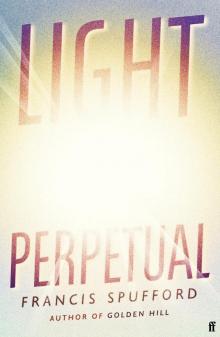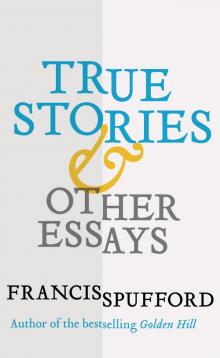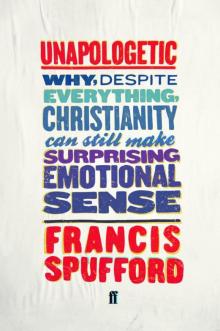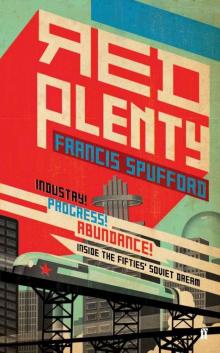- Home
- Francis Spufford
Unapologetic
Unapologetic Read online
Unapologetic
FRANCIS SPUFFORD
For
Jessica
Judith
David
my three reverend doctors
Contents
Title Page
Dedication
1: Unapologetic
2: The Crack in Everything
3: Big Daddy
4: Hello, Cruel World
5: Yeshua
6: Et Cetera
7: The International League of the Guilty, Part Two
8: Consequences
Notes
About the Author
By the same author
Copyright
1
Unapologetic
My daughter has just turned six. Some time over the next year or so, she will discover that her parents are weird. We’re weird because we go to church.
This means – well, as she gets older there’ll be voices telling her what it means, getting louder and louder until by the time she’s a teenager they’ll be shouting right in her ear. It means that we believe in a load of bronze-age absurdities. It means that we don’t believe in dinosaurs. It means that we’re dogmatic. That we’re self-righteous. That we fetishise pain and suffering. That we advocate wishy-washy niceness. That we promise the oppressed pie in the sky when they die. That we’re bleeding hearts who don’t understand the wealth-creating powers of the market. That we’re too stupid to understand the irrationality of our creeds. That we build absurdly complex intellectual structures, full of meaningless distinctions, on the marshmallow foundations of a fantasy. That we uphold the nuclear family, with all its micro-tyrannies and imprisoning stereotypes. That we’re the hairshirted enemies of the ordinary family pleasures of parenthood, shopping, sex and car ownership. That we’re savagely judgemental. That we’d free murderers to kill again. That we think everyone who disagrees with us is going to roast for all eternity. That we’re as bad as Muslims. That we’re worse than Muslims, because Muslims are primitives who can’t be expected to know any better. That we’re better than Muslims, but only because we’ve lost the courage of our convictions. That we’re infantile and can’t do without an illusory daddy in the sky. That we destroy the spontaneity and hopefulness of children by implanting a sick mythology in young minds. That we oppose freedom, human rights, gay rights, individual moral autonomy, a woman’s right to choose, stem cell research, the use of condoms in fighting AIDS, the teaching of evolutionary biology. Modernity. Progress. That we think everyone should be cowering before authority. That we sanctify the idea of hierarchy. That we get all snooty and yuck-no-thanks about transsexuals, but think it’s perfectly normal for middle-aged men to wear purple dresses. That we cover up child abuse, because we care more about power than justice. That we’re the villains in history, on the wrong side of every struggle for human liberty. That if we sometimes seem to have been on the right side of one of said struggles, we weren’t really; or the struggle wasn’t about what it appeared to be about; or we didn’t really do the right thing for the reasons we said we did. That we’ve provided pious cover stories for racism, imperialism, wars of conquest, slavery, exploitation. That we’ve manufactured imaginary causes for real people to kill each other. That we’re stuck in the past. That we destroy tribal cultures. That we think the world’s going to end. That we want to help the world to end. That we teach people to hate their own natural selves. That we want people to be afraid. That we want people to be ashamed. That we have an imaginary friend; that we believe in a sky pixie; that we prostrate ourseves before a god who has the reality status of Santa Claus. That we prefer scripture to novels, preaching to storytelling, certainty to doubt, faith to reason, law to mercy, primary colours to shades, censorship to debate, silence to eloquence, death to life.
But hey, that’s not the bad news. Those are the objections of people who care enough about religion to object to it – or to rent a set of recreational objections from Richard Dawkins or Christopher Hitchens. As accusations, they may be a hodge-podge, a mish-mash of truths and half-truths and untruths plucked from radically different parts of Christian history and the Christian world, with the part continually taken for the whole (if the part is damaging) or the whole for the part (if it’s flattering) – but at least they assume there’s a thing called religion there which looms with enough definition and significance to be detested. In fact there’s something truly devoted about the way that Dawkinsites manage to extract a stimulating hobby from the thought of other people’s belief. The ones in this country must be envious of the intensity of the anti-religious struggle in the United States; yet some of them even contrive to feel oppressed by the Church of England, which is not easy to do. It must take a deft delicacy at operating on a tiny scale, like doing needlepoint, or playing Subbuteo, or fitting a whole model-railway layout into an attaché case.
No: the really painful message our daughter will receive is that we’re embarrassing. For most people who aren’t New Atheists, or old atheists, and have no passion invested in the subject, either negative or positive, believers aren’t weird because we’re wicked. We’re weird because we’re inexplicable; because, when there’s no necessity for it that anyone sensible can see, we’ve committed ourselves to a set of awkward and absurd attitudes which obtrude, which stick out against the background of modern life, and not in some important or respect-worthy or principled way either; more in the way that some particularly styleless piece of dressing does, which makes the onlooker wince and look away and wonder if some degree of cerebral deficiency is involved. Believers are people with pudding-bowl haircuts, wearing anoraks in August, and chunky-knit sweaters the colour of vomit. Or, to pull it back from the metaphor of clothing to the bits of behaviour that the judgement is really based on, believers are people who try to insert Jee-zus into conversations at parties; who put themselves down, with writhings of unease, for perfectly normal human behaviour; who are constantly trying to create a solemn hush that invites a fart, a hiccup, a bit of subversion. Believers are people who, on the rare occasions when you have to listen to them, like at a funeral or a wedding, seize the opportunity to pour the liquidised content of a primary-school nativity play into your earhole, apparently not noticing that childhood is over. And as well as being childish, and abject, and solemn, and awkward, we voluntarily associate ourselves with an old-fashioned mildewed orthodoxy, an Authority with all its authority gone. Nothing is so sad – sad from the style point of view – as the mainstream taste of the day before yesterday. If we couldn’t help ourselves, if we absolutely had to go shopping in the general area of woo-hoo and The-Force-Is-Strong-In-You-Young-Skywalker, we could at least have picked something new and colourful, something with a bit of gap-year spiritual zing to it, possibly involving chanting and spa therapies. Instead of which, we chose old buildings that smell of dead flowers, and groups of pensioners laboriously grinding their way through ‘All Things Bright and Beautiful’. Rebel cool? Not so much.
And worst, as I said before, there is no reason for it. No obvious lack that this sad stuff could be an attempt to supply, however cack-handed. Most people don’t have a God-shaped space in their minds, waiting to be filled, or the New Atheist counterpart, a lack-of-God-shaped space, filled with the swirly, pungent vapours of polemic. Most people’s lives provide them with a full range of loves and hates and joys and despairs, and a moral framework by which to understand them, and a place for awe and transcendence, without any need for religion. Believers are the people touting a solution without a problem, and an embarrassing solution too, a really damp-palmed, wide-smiling, can’t-dance solution. In an anorak.
And so what goes on inside believers is mysterious. So far as it can be guessed at – if for some reason you wanted to
guess at it – it appears to be a kind of anxious pretending, a kind of continual, nervous resistance to reality. It looks as if, to a believer, things can never be allowed just to be what they are. They always have to be translated, moralised – given an unnecessary and rather sentimental extra meaning. A sunset can’t just be part of the mixed magnificence and cruelty and indifference of the world; it has to be a blessing. A meal has to be a present you’re grateful for, even if it came from Tesco and the ingredients cost you £7.38. Sex can’t be the spectrum of experiences you get used to as an adult, from occasional earthquake through to mild companionable buzz; it has to be, oh dear oh dear, a special thing that happens when mummies and daddies love each other very much. Presumably, all of these specific little refusals of common sense reflect our great big central failure of realism, our embarrassing trouble with the distinction, basic to adulthood, between stuff that exists and stuff that is made up. We don’t seem to get it that the magic in Harry Potter, the rings and swords and elves in fantasy novels, the power-ups in video games, the ghouls and ghosts of Hallowe’en, are all, like, just for fun. We try to take them seriously; or rather, we take our own particular subsection of them seriously. We commit the bizarre category error of claiming that our goblins, ghouls, Flying Spaghetti Monsters are really there, off the page and away from the rendering programmes in the CGI studio. Star Trek fans and vampire wannabes have nothing on us. We actually get down and worship. We get down on our actual knees, bowing and scraping in front of the empty space where we insist our Spaghetti Monster can be found. No wonder that we work so hard to fend off common sense. Our fingers must be in our ears all the time – lalalala, I can’t hear you – just to keep out the plain sound of the real world.
The funny thing is that to me it’s exactly the other way around. In my experience, it’s belief that involves the most uncompromising attention to the nature of things of which you are capable. It’s belief which demands that you dispense with illusion after illusion, while contemporary common sense requires continual, fluffy pretending. Pretending that might as well be systematic, it’s so thoroughly incentivised by our culture. Take the famous slogan on the atheist bus in London. I know, I know, that’s an utterance by the hardcore hobbyists of unbelief, the people who care enough to be in a state of negative excitement about religion, but in this particular case they’re pretty much stating the ordinary wisdom of everyday disbelief. (Rather than, for example, rabbiting on about orbital teapots.) The atheist bus says, ‘There’s probably no God. Now stop worrying and enjoy your life.’ All right then: which word here is the questionable one, the aggressive one, the one that parts company with actual recognisable human experience so fast it doesn’t even have time to wave goodbye? It isn’t ‘probably’. New Atheists aren’t claiming anything outrageous when they say that there probably isn’t a God. In fact they aren’t claiming anything substantial at all, because really, how the fuck would they know? It’s as much of a guess for them as it is for me. No, the word that offends against realism here is ‘enjoy’. I’m sorry – enjoy your life? Enjoy your life? I’m not making some kind of neo-puritan objection to enjoyment. Enjoyment is lovely. Enjoyment is great. The more enjoyment the better. But enjoyment is one emotion. The only things in the world that are designed to elicit enjoyment and only enjoyment are products, and your life is not a product; you cannot expect to unwrap it, and place it in an advantageous corner of your Docklands flat, and admire the way the halogen spots on your lighting track gleam on its sleek sides. Only sometimes, when you’re being lucky, will you stand in a relationship to what’s happening to you where you’ll gaze at it with warm, approving satisfaction. The rest of the time, you’ll be busy feeling hope, boredom, curiosity, anxiety, irritation, fear, joy, bewilderment, hate, tenderness, despair, relief, exhaustion and the rest. It makes no more sense to say that you should feel the single emotion of enjoyment about your life than to say that you should spend it entirely in a state of fear, or of hopping-from-foot-to-foot anticipation. Life just isn’t unanimous like that. To say that life is to be enjoyed ( just enjoyed) is like saying that mountains should only have summits, or that all colours should be purple, or that all plays should be by Shakespeare. This really is a bizarre category error.
But not necessarily an innocent one. Not necessarily a piece of fluffy pretending that does no harm. The implication of the bus slogan is that enjoyment would be your natural state if you weren’t being ‘worried’ by us believers and our hellfire preaching. Take away the malignant threat of God-talk, and you would revert to continuous pleasure, under cloudless skies. What’s so wrong with this, apart from it being total bollocks? Well, in the first place, it buys a bill of goods, sight unseen, from modern marketing. Given that human life isn’t and can’t be made up of enjoyment, it is in effect accepting a picture of human life in which the pieces of living where easy enjoyment is more likely become the only pieces that are visible. You’d think, if you based your knowledge of the human species exclusively on adverts, that the normal condition of humanity was to be a good-looking single between twenty and thirty-five, with excellent muscle definition and/or an excellent figure, and a large disposable income. Clearly, there are exceptions, such as the lovey-dovey silver-agers who consume Viagra and go on Saga cruises, and the wisecracking moppets who promote breakfast cereal, but the centre of gravity of the human race, our default condition, is to be young, buff and available. And you’d think the same thing if you got your information exclusively from the atheist bus, with the minor difference that, in this case, the man from the Gold Blend couple has a tiny wrinkle of concern on his handsome forehead, caused by the troublesome thought of God’s possible existence: a wrinkle about to be removed by one magic application of Reason™.
These plastic beings don’t need anything that they can’t get by going shopping. But suppose, as the atheist bus goes by, that you are the fifty-something woman with the Tesco bags, trudging home to find out whether your dementing lover has smeared the walls of the flat with her own shit again. Yesterday when she did it, you hit her, and she mewled till her face was a mess of tears and mucus which you also had to clean up. The only thing that would ease the weight on your heart would be to tell the funniest, sharpest-tongued person you know about it: but that person no longer inhabits the creature who will meet you when you unlock the door. Respite care would help, but nothing will restore your sweetheart, your true love, your darling, your jo. Or suppose you’re that boy in the wheelchair, the one with the spasming corkscrew limbs and the funny-looking head. You’ve never been able to talk, but one of your hands has been enough under your control to tap out messages. Now the electrical storm in your nervous system is spreading there too, and your fingers tap more errors than readable words. Soon your narrow channel to the world will close altogether, and you’ll be left all alone in the hulk of your body. Research into the genetics of your disease may abolish it altogether in later generations, but it won’t rescue you. Or suppose you’re that skanky-looking woman in the doorway, the one with the rat’s nest of dreadlocks. Two days ago you skedaddled from rehab. The first couple of hits were great: your tolerance had gone right down, over two weeks of abstinence and square meals, and the rush of bliss was the way it used to be when you began. But now you’re back in the grind, and the news is trickling through you that you’ve fucked up big time. Always before you’ve had this story you tell yourself about getting clean, but now you see it isn’t true, now you know you haven’t the strength. Social services will be keeping your little boy. And in about half an hour you’ll be giving someone a blowjob for a fiver behind the bus station. Better drugs policy might help, but it won’t ease the need, and the shame over the need, and the need to wipe away the shame.
So when the atheist bus comes by, and tells you that there’s probably no God so you should stop worrying and enjoy your life, the slogan is not just bitterly inappropriate in mood. What it means, if it’s true, is that anyone who isn’t enjoying themselves is entirely on their
own. The three of you are, for instance; you’re all three locked in your unshareable situations, banged up for good in cells no other human being can enter. What the atheist bus says is: there’s no help coming. Now, don’t get me wrong. I don’t think there’s any help coming, in one large and important sense of the term. I don’t believe anything is going to happen which will materially alter the position these three people find themselves in. But let’s be clear about the emotional logic of the bus’s message. It amounts to a denial of hope or consolation, on any but the most chirpy, squeaky, bubble-gummy reading of the human situation. St Augustine called this kind of thing ‘cruel optimism’ fifteen hundred years ago, and it’s still cruel.
Or for a piece of famous fluffiness that doesn’t just pretend about what real lives can be like, but moves on into one of the world’s least convincing pretences about what people themselves are like, consider the teased and coiffed nylon monument that is ‘Imagine’: surely the My Little Pony of philosophical statements. John and Yoko all in white, John at the white piano, John drifting through the white rooms of a white mansion, and all the while the sweet drivel flowing. Imagine there’s no heaven. Imagine there’s no hell. Imagine all the people, living life in – hello? Excuse me? Take religion out of the picture, and everybody spontaneously starts living life in peace? I don’t know about you, but in my experience peace is not the default state of human beings, any more than having an apartment the size of Joey and Chandler’s is. Peace is not the state of being we return to, like water running downhill, whenever there’s nothing external to perturb us. Peace between people is an achievement, a state of affairs we put together effortfully in the face of competing interests, and primate dominance dynamics, and our evolved tendency to cease our sympathies at the boundaries of our tribe. Peace within people is made difficult to say the least by the way that we tend to have an actual, you know, emotional life going on, rather than an empty space between our ears with a shaft of dusty sunlight in it, and a lone moth flittering round and round. Peace is not the norm; peace is rare, and where we do manage to institutionalise it in a human society, it’s usually because we’ve been intelligently pessimistic about human proclivities, and found a way to work with the grain of them in a system of intense mutual suspicion like the US Constitution, a document which assumes that absolutely everybody will be corrupt and power-hungry given half a chance. As for the inner version, I’m not at peace all that often, and I doubt you are either. I’m absolutely bloody certain that John Lennon wasn’t. The mouthy Scouse git he was as well as the songwriter of genius, the leatherboy who allegedly kicked his best friend in the head in Hamburg, didn’t go away just because he put on the white suit. What seems to be at work in ‘Imagine’ is the idea – always beloved by those who are frightened of themselves – that we’re good underneath, good by nature, and only do bad things because we’ve been forced out of shape by some external force, some malevolent aspect of this world’s power structures. In this case, I suppose, by the education the Christian Brothers were dishing out in 1950s Liverpool, which was strong on kicks and curses, and loving descriptions of the tortures of the damned. It’s a theory that isn’t falsifiable, because there always are power structures there to be blamed when people behave badly. Like the theory that markets left to themselves would produce perfectly just outcomes (when markets never are left to themselves) it’s immune to disproof. But, and let me put this as gently as I can, it doesn’t seem terribly likely. We long to believe it because it’s what we lack. We dream of the peace we haven’t got, and to make ourselves look as if we do have it, we dress ourselves up in the iconography of the heaven we just announced we were ditching. White robes, the celestial glare of over-exposed film: ‘Imagine’ looks like one part A Matter of Life and Death to one part Hymns Ancient and Modern. Only sillier.

 Light Perpetual
Light Perpetual True Stories
True Stories The Child that Books Built
The Child that Books Built Golden Hill
Golden Hill Unapologetic
Unapologetic Red Plenty
Red Plenty Backroom Boys
Backroom Boys